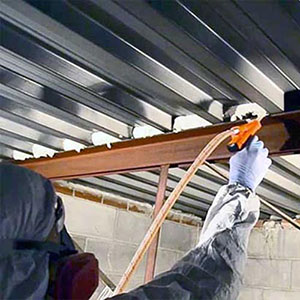Leading Reasons to Pick Spray Foam for Your Next Insulation Job
When taking into consideration insulation alternatives for your following task, spray foam stands out due to its impressive performance characteristics and efficiency benefits. As you weigh your choices, exploring the versatile applications and long-term benefits of spray foam might expose compelling reasons to incorporate it into your insulation strategy.
Superior Insulation Efficiency

The high R-value of spray foam, which determines its thermal resistance, is one more crucial benefit. Closed-cell spray foam, for example, can attain an R-value of up to 6.5 per inch, considerably outmatching fiberglass batts and cellulose. Spray foam insulation produces a closed seal, which reduces thermal connecting and decreases the capacity for mold growth due to moisture buildup.

Energy Efficiency Advantages
The power performance advantages of spray foam insulation are significant, more enhancing its appeal as a top option for developing insulation. Among the main benefits is its remarkable thermal efficiency. Spray foam increases upon application, developing an impermeable seal that decreases air leaks, which is an usual source of energy loss in typical insulation materials. By effectively decreasing thermal bridging, it preserves a constant indoor temperature, thereby decreasing home heating and air conditioning costs.
Furthermore, spray foam insulation flaunts a high R-value per inch, which means it uses extra thermal resistance in much less space contrasted to alternatives like fiberglass or cellulose (Spray Foam). This effectiveness not only adds to instant energy financial savings but also promotes lasting sustainability by decreasing the general power consumption of a building
In addition, the application of spray foam can qualify homeowners for power effectiveness motivations and tax credit ratings, including monetary benefits to its energy-saving abilities. In an age where energy preservation is vital, picking spray foam insulation not only enhances comfort yet also straightens with eco liable techniques, making it a prudent option for both property and business projects.
Wetness and Mold Resistance
Provided its one-of-a-kind make-up and application technique, spray foam insulation supplies outstanding moisture and mold and mildew resistance, making it an optimal option for numerous settings. The closed-cell framework of spray foam produces a solid barrier that effectively secures off prospective moisture ingress, therefore minimizing the likelihood of mold development. Unlike standard insulation products, which can soak up water and provide a reproduction ground for mold, spray foam continues to be unsusceptible wetness, enhancing the overall health and wellness of the interior setting.
In addition, the application procedure of spray foam entails increasing and filling spaces and cracks, making sure a tight seal that lessens air leakages. This particular not just enhances energy performance however additionally helps control humidity degrees within the room. Proper humidity control is critical for preventing mold and mildew and mold, making spray foam insulation particularly useful in locations susceptible to wetness, such as cellars and creep areas.
Along with its moisture-resistant buildings, spray foam is also inherently immune to mold and mildew development. This characteristic guarantees that homes and structures continue to be healthy and secure gradually, giving peace of mind to home owners and structure managers alike.
Long-Term Cost Savings
Buying spray foam insulation yields substantial long-lasting expense savings, mostly through boosted power performance. Unlike conventional insulation materials, spray foam creates an airtight seal that lessens air leakage. This decrease in drafts leads to decrease heating and air conditioning costs, as HVAC systems do not need to work as difficult to keep comfy indoor temperature levels.
Furthermore, the superior protecting residential properties of spray foam indicate that homes stay continually comfy year-round, reducing reliance on energy-consuming appliances. Over time, these savings can build up, causing an obvious decrease in energy expenses.
In addition, spray foam insulation adds to the durability of your home's structure by stopping dampness buildup and mold growth, which can lead to costly repair work. With its longevity and resistance to settling, spray foam maintains its effectiveness over the years, guaranteeing that the preliminary investment remains to pay off.
Essentially, choosing spray foam insulation not only enhances your home's energy performance yet additionally converts right into considerable long-lasting financial benefits, making it a sensible financial investment for home owners aiming to minimize expenses while enhancing comfort and sustainability.
Versatile Application Alternatives
Countless application choices make spray foam insulation an extremely versatile selection for a range of building projects (Spray Foam). This flexibility enables it to be efficiently utilized in residential, business, and commercial settings, dealing with varied insulation requirements
Spray foam can be used in attic rooms, walls, creep areas, and also roofings, offering seamless insurance coverage that gets rid of voids and voids where air leaks generally happen. Its ability to increase upon application guarantees a limited seal, which is necessary for energy performance and wetness control.
Moreover, spray foam insulation is offered in different formulas, including open-cell and closed-cell types, permitting for tailored remedies based on certain pop over to these guys task demands. Open-cell foam is lighter and far better suited for soundproofing, while closed-cell foam uses superior insulation and structural honesty, making it excellent for areas subjected to dampness.
Furthermore, spray foam can be applied in hard-to-reach rooms, enhancing its suitability for retrofitting existing structures. With the capability to comply with different substratums, including steel, concrete, and timber, spray foam insulation stands apart as a functional option that meets the demands of contemporary structure techniques.
Conclusion
In verdict, spray foam insulation emerges as a premium option for insulation jobs due to its remarkable thermal resistance, power performance, and capability to develop airtight seals that stop dampness and moved here mold growth. Picking spray foam insulation ensures a detailed remedy that meets the demands of modern-day building and construction and energy effectiveness criteria.
When it comes to attaining optimal energy effectiveness in commercial and property structures, spray foam insulation stands out for its premium insulation performance.The energy efficiency benefits of spray foam insulation are considerable, more enhancing its appeal as a top selection for building insulation.Investing in spray foam insulation yields significant long-term cost savings, mainly with improved energy effectiveness.In final thought, spray foam insulation emerges as an exceptional choice for insulation jobs due to its extraordinary thermal resistance, energy effectiveness, and ability to create airtight seals that prevent moisture and mold and mildew development. Choosing spray foam insulation makes sure a detailed service that meets the demands of modern-day building and Click Here construction and power effectiveness standards.